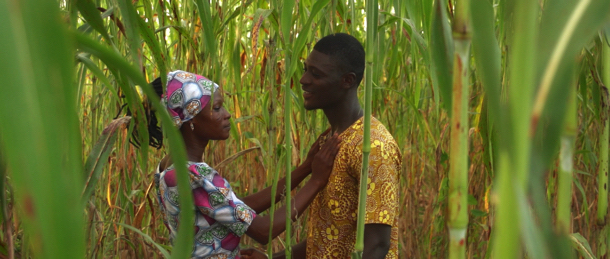
Director: T.W. Pittman, Kelly Daniela Norris
Cast; Jacob Ayanaba, Grace Ayariga, Abdul Aziz; Ghana/USA, 90 min.
NAKOM is the first feature film from Ghana ever to screen in Berlinale and a very worthwhile contribution is it too. Co-director Pittman spent two years collaborating with the US Peace Corp in the village that gave the film its title.
Iddrisu (Ayanaba) is enjoying his medical studies in the big city: his work is promising and he is happy with his girlfriend. But then, out of the blue, he finds out his father has been killed in a motorcycle accident, and being the oldest son of the family, has to return home. A mountain of family debt emerges when going through his father’s affairs and the family farm is run down. Confronted by the old, traditional set-up, Iddrisu finds life at home very problematic. His uncle suggests toughly: ‘I can marry your mother and throw you out of the house, if I want to’. Iddrisu is appalled to see how young women are treated in the village; and he feels himself regressing: he is a newcomer, who is out of touch. Gender roles and a strict hierarchy mean that Iddrisu has to make a big decision.
NAKOM was a challenging film to make. The four month shooting was made extremely difficult for various reasons: firstly, the Kusaal language, spoken in Nakom, has no written equivalent. It meant that the co-producer had to work with the non-professional actors, relying the script orally. Also there was no electricity in the village, so the producers considered moving the set to the nearby town of Pusiga, but finally, the production remained in Nakom, using a generator, which had to be buried underground because of its noise. Casting was a problem due to the scarcity of local actors and the onset of the rainy season which meant that the narrative had to be shot in reverse when the landscape was lush and green.
Cinematographer Robert Geile creates a magnificent sense of the place: the serene, picturesque countryside provides refreshing contrast from the hustle and bustle of the city life, evoking a visual story of Iddrisu’s transit from the modern world to that of deep-seated traditions and old-fashioned customs. The spontaneity of the performances is infectious making NAKOM a fresh-feeling and absorbing testament to neo-real tradition. AS
BERLINALE 11-21 FEBRUARY 2016 | MORE COVERAGE UNDER BERLINALE 2016